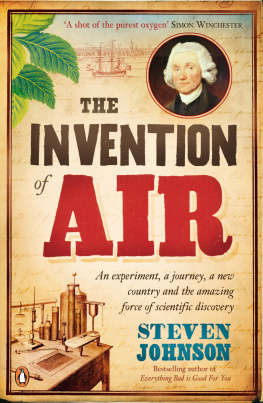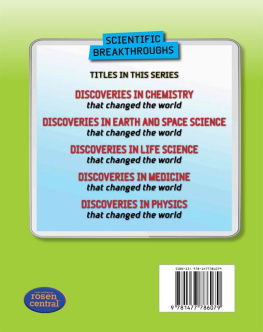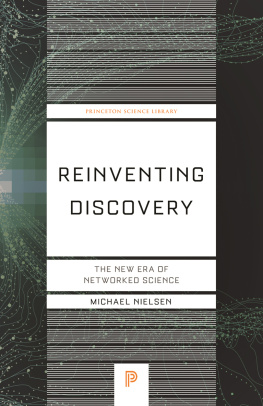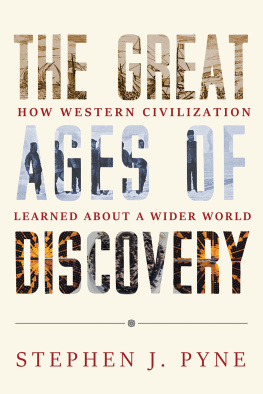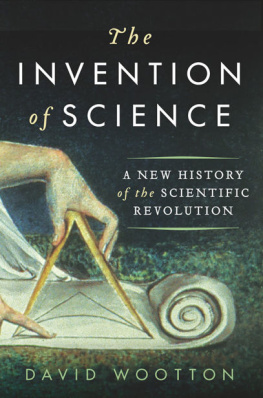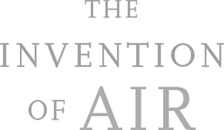AN EXPERIMENT, A JOURNEY, A NEW COUNTRY, AND THE AMAZING FORCE OF SCIENTIFIC DISCOVERY
STEVEN
JOHNSON
PENGUIN BOOKS
PENGUIN BOOKS
Published by the Penguin Group
Penguin Books Ltd, 80 Strand, London WC2R 0RL , England
Penguin Group (USA) Inc., 375 Hudson Street, New York, New York 10014, USA
Penguin Group (Canada), 90 Eglinton Avenue East, Suite 700, Toronto, Ontario, Canada M4P 2Y3
(a division of Pearson Penguin Canada Inc.)
Penguin Ireland, 25 St Stephens Green, Dublin 2, Ireland (a division of Penguin Books Ltd)
Penguin Group (Australia), 250 Camberwell Road, Camberwell, Victoria 3124, Australia
(a division of Pearson Australia Group Pty Ltd)
Penguin Books India Pvt Ltd, 11 Community Centre, Panchsheel Park, New Delhi - 110 017, India
Penguin Group (NZ), 67 Apollo Drive, Rosedale, North Shore 0632, New Zealand
(a division of Pearson New Zealand Ltd)
Penguin Books (South Africa) (Pty) Ltd, 24 Sturdee Avenue, Rosebank, Johannesburg 2196, South Africa
Penguin Books Ltd, Registered Offices: 80 Strand, London WC2R 0RL , England
www.penguin.com
First published in the United States of America by the Penguin Group (USA) Inc. 2008
First published in Great Britain by Penguin Books 2009
Copyright Steven Johnson, 2009
All rights reserved
The moral right of the author has been asserted
Except in the United States of America, this book is sold subject to the condition that it shall not, by way of trade or otherwise, be lent, re-sold, hired out, or otherwise circulated without the publishers prior consent in any form of binding or cover other than that in which it is published and without a similar condition including this condition being imposed on the subsequent purchaser
ISBN: 978-0-14-104491-0
PENGUIN BOOKS
THE INVENTION OF AIR
Steven Johnson is the author of the acclaimed books Everything Bad is Good for You (described as a must read by Mark Thompson, head of the BBC), The Ghost Map, Mind Wide Open, Emergence and Interface Culture. His writing has appeared in the Guardian, the New Yorker, Nation and Harpers, as well as the op-ed pages of The New York Times and the Wall Street Journal. He is also the co-creator of several influential websites: FEED, Plastic, and Outside.in. He has degrees in Semiotics and English Literature from Brown and Columbia Universities. He lives in Brooklyn with his wife and three sons.
ALSO BY STEVEN JOHNSON
Interface Culture:
How New Technology Transforms the Way
We Create and Communicate
Emergence:
The Connected Lives of Ants, Brains, Cities, and Software
Mind Wide Open:
Your Brain and the Neuroscience of Everyday Life
Everything Bad Is Good for You:
How Todays Popular Culture Is Actually Making Us Smarter
The Ghost Map:
The Story of Londons Most Terrifying Epidemic
and How It Changed Science, Cities, and the Modern World
For Jay
The English hierarchy (if there be anything unsound in its constitution) has equal reason to tremble at an air pump, or an electrical machine.
JOSEPH PRIESTLEY
That ideas should freely spread from one to another over the globe, for the moral and mutual instruction of man, and improvement of his condition, seems to have been peculiarly and benevolently designed by nature, when she made them, like fire, expansible over all space, without lessening their density at any point, and like the air in which we breathe, move, and have our physical being, incapable of confinement or exclusive appropriation.
THOMAS JEFFERSON
AUTHORS NOTE
The book you are about to read is a celebration of the collaborative nature of genius, and of the creative power that comes from thinking across intellectual boundaries. Wherever ideas are allowed to circulate freely, wherever complex networks emerge, innovation tends to flourish: the boisterous intellectual hub of the London coffeehouse; the dazzling fusion of science and industry that was the Lunar Society; the enduring political and scientific duet between Joseph Priestley and Benjamin Franklin.
But as an American writing his second consecutive book with a British protagonist, I was inevitably drawn to one crucial element of the history: The Invention Of Air happens to be a story about a world-changing collaboration between England and America, between one of the great figures of the British Enlightenment and several of the American founding fathers. The two countries have a long history of fruitful partnerships, of course, but it is rare indeed to uncover a story of such mutual support and inspiration that unfolds precisely during the period of the greatest hostility between the two nations, in the years surrounding the War of Independence. Joseph Priestley is rightly celebrated in the United Kingdom for his contributions to science and theology, but he deserves just as much credit for his extraordinary impact on the early years of the American experiment. His rich camaraderie with Franklin and Jefferson during decades of bitter conflict and war set the tone for the centuries of transatlantic collaboration that would follow.
A few days before I started writing this book, a leading candidate for the presidency of the United States was asked on national television whether he believed in the theory of evolution. His shrugged off the question with an dismissive jab of humor. Its interesting that that question would even be asked of someone running for president, he said. Im not planning on writing the curriculum for an eighth-grade science book. Im asking for the opportunity to be
It was a funny line, but the joke only worked in a specific intellectual context. For the statement to make sense, the speaker had to share one basic assumption with his audience: that science was some kind of specialized intellectual field, about which political leaders neednt know anything to do their business. Imagine a candidate dismissing a question about his foreign policy experience by saying he was running for president and not writing an International Affairs textbook. The joke wouldnt make sense, because we assume that foreign policy expertise is a central qualification for the Chief Executive. But science? Thats for the guys in lab coats.
That line has stayed with me since, because the web of events at the center of this book suggest that its basic assumptions are fundamentally flawed. If there is an overarching moral to this story, it is that vital fields of intellectual achievement cannot be cordoned off from one another and relegated to the specialists, that politics can and should be usefully informed by the insights of science. The protagonists that are central to this story lived in a climate where ideas flowed easily between the realms of politics, philosophy, religion, and science. The closest thing to a hero in this bookthe chemist, theologian, and political theorist Joseph Priestleyspent his whole career in the space that connects those different fields. But the other characters central to this storyBen Franklin, John Adams, Thomas Jeffersonsuggest one additional reading of the eighth-grade science remark. It was anti-intellectual, to be sure, but it was something even more incendiary in the context of a presidential race. It was positively un-American.

